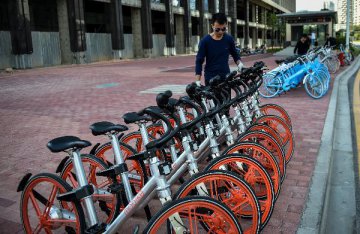
The seas of haphazardly parked orange, yellow and blue bikes outside subway entrances and sidewalks in Chinese cities may soon dry up.
The Chinese government decided Monday to consider regulating bike-sharing services, which have boomed nationwide but led to problems such as congested city sidewalks.
The Ministry of Transport (MOT) will solicit public opinion from May 22 to June 5 on draft rules requiring local governments to better manage bike sharing and arrange for orderly parking.
About 30 bike-sharing brands have sprung up in China, placing millions of bicycles on streets around the country and attracting over 100 million users.
After scanning a bicycle's QR code with a smartphone, riders can pedal away for as little as 0.5 yuan (7.3 U.S. cents ). The services allow users to pick up or drop off a bike almost anywhere.
However, careless parking of the bicycles will be recorded and regulated in the future as the draft rules require real-name registration for the bike-sharing service.
The MOT is also considering setting up a database to record users' behavior. D
ue to safety concerns, the rules forbid children under the age of 12 from riding shared bikes and ban shared electric bikes.
The transportation regulator urged bike-sharing platforms to protect user privacy. It also encouraged them to offer service without requiring deposits and to ensure that users will not lose their deposits when companies merge or go out of business.
Many bike-sharing apps require users to deposit between 99 and 299 yuan before using the service. However, some pioneers have eliminated the fee after reviewing users' credit records.
A total of nine bike-sharing brands have introduced discounted or free deposits for users based on their Alipay credit performance, according to Ant Financial, the affiliate financial service of Chinese e-commerce giant Alibaba.
Market players such as Mobike and Ofo have been speeding up expansion at home and abroad while updating their bikes and increasing output to grab bigger market share.
"There have been some complaints about excess stock of bikes in some regions of some cities," said Cai Tuanjie, a senior official with the MOT, citing poor management of some bike-sharing platforms.
Bike-sharing operators should study specific conditions in different cities to ensure rational allocation of the bikes and avoid excess supply in some areas, Cai added.
The MOT also suggested that parking zones should be established around major transportation hubs, shopping areas and office blocks, and the parking of shared bikes should be supervised and orderly.
It advised local authorities to improve bike transportation networks while making lists of areas off-limits for parking.
Mobike and Ofo, the two biggest players in the bike-sharing market, both voiced support for the draft rules and called for sustainable development of the sector.
The MOT will avoid compromising parking flexibility with too many restraints and try to balance the demands of all stakeholders to ensure safe and convenient use of shared bikes, Cai added.
























Latest comments